
awesome-mcp-servers
Awesome MCP Servers - A curated list of Model Context Protocol servers
Stars: 1551
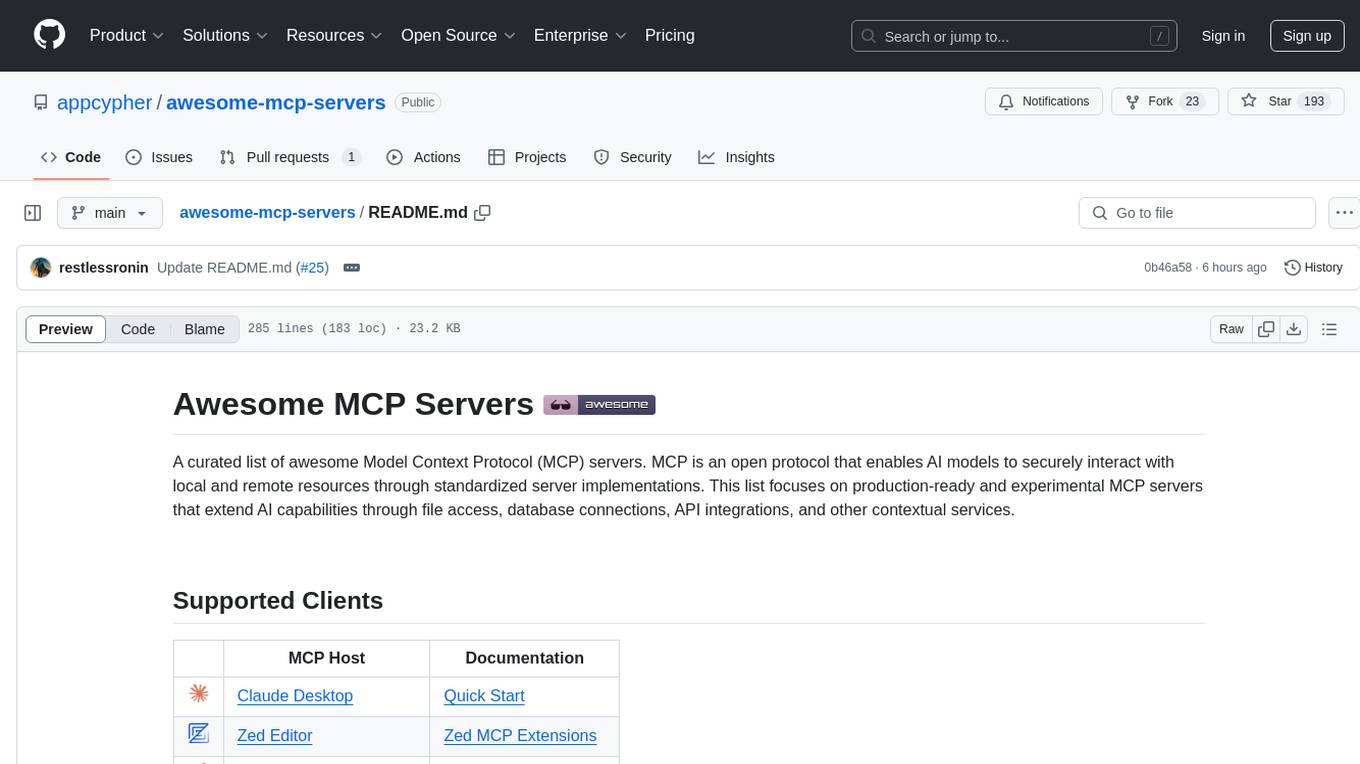
A curated list of awesome Model Context Protocol (MCP) servers that enable AI models to securely interact with local and remote resources through standardized server implementations. The list focuses on production-ready and experimental servers extending AI capabilities through file access, database connections, API integrations, and other contextual services.
README:
A curated list of awesome Model Context Protocol (MCP) servers. MCP is an open protocol that enables AI models to securely interact with local and remote resources through standardized server implementations. This list focuses on production-ready and experimental MCP servers that extend AI capabilities through file access, database connections, API integrations, and other contextual services.
- 📂 - File Systems
- 🔄 - Version Control
- ☁️ - Cloud Storage
- 🗄️ - Databases
- 💬 - Communication
- 📈 - Monitoring
- 🔍 - Search & Web
- 🗺️ - Location Services
- 🎯 - Marketing
- 📝 - Note Taking
- ⚡ - Cloud Platforms
- ⚙️ - Workflow Automation
- 🤖 - System Automation
- 📱 - Social Media
- 💹 - Finance
- 🧬 - Research & Data
- 🤝 - AI Services
- 📦 - Virtualization
- 💻 - Development Tools
- 📊 - Data Visualization
- 🆔 - Identity
- ⭐ Official protocol implementation
- 1 First implementation (when multiple implementations exist)
- 2 Second implementation
- 3 Third implementation
- n Subsequent implementations
See Helpful Tools & Utilities section for tools to help manage, configure, and work with MCP servers.
Provides direct access to local file systems with configurable permissions. Enables AI models to read, write, and manage files within specified directories.
-
Backup - Provides file and folder backup and restoration capabilities for AI agents and code editing tools
-
FileSystem1 - Direct local file system access
-
FileSystem2 - Golang implementation for local file system access
-
Everything Search - Lightning-fast Windows file search powered by Everything SDK
-
llm-context - Share code context with LLMs via Model Context Protocol or clipboard
Interact with Git repositories and version control platforms. Enables repository management, code analysis, pull request handling, issue tracking, and other version control operations through standardized APIs.
-
GitHub - GitHub API integration for repository management, PRs, issues, and more
-
GitLab - GitLab platform integration for project management and CI/CD operations
-
Git - Direct Git repository operations including reading, searching, and analyzing local repositories
-
Phabricator - Phabricator API integration for repository and project management
-
Gitingest-MCP - Gitingest integration providing prompt friendly summmaries of Github repos
Access and manage files stored in cloud storage platforms. Enables searching, reading, and organizing cloud-stored documents and data.
-
Google Drive - Google Drive integration for file access, search, and management
Secure database access with schema inspection capabilities. Enables querying and analyzing data while maintaining read-only safety by default.
-
PostgreSQL - PostgreSQL database integration with schema inspection and query capabilities
-
SQLite - SQLite database operations with built-in analysis features
-
DuckDB - DuckDB database integration with schema inspection and query capabilities
-
BigQuery1 - BigQuery database integration with schema inspection and query capabilities
-
BigQuery2 - A BigQuery MCP server for read-only SQL queries and schema exploration (available on npm)
-
Neon⭐ - Neon MCP Server. Allows natural language interactions with Neon for database management.
-
Qdrant⭐ - A Qdrant MCP server for keeping and retrieving memories in the Qdrant vector search engine.
-
MongoDB - A Model Context Protocol Server for querying and analyzing MongoDB collections.
-
MongoDB Lens - Full featured MCP Server for MongoDB databases.
-
MySQL - MySQL database integration with configurable access controls and schema inspection
-
Airtable - Read and write access to Airtable databases, with schema inspection.
-
Snowflake - Snowflake database integration with read/write capabilities and insight tracking.
-
DBUtils - A unified database access service for MCP that seamlessly integrates PostgreSQL and SQLite with a clean abstraction layer.
-
TiDB - MCP server implementation for TiDB (serverless) database.
Integration with communication platforms for message management and channel operations. Enables AI models to interact with team communication tools.
-
Slack - Slack workspace integration for channel management and messaging
-
Linear - Linear MCP Server. Provides integration with Linear's issue tracking system through MCP.
-
Atlassian - Comprehensive integration with Atlassian suite including Confluence for documentation management and Jira for issue tracking.
Access and analyze application monitoring data. Enables AI models to review error reports and performance metrics.
-
Sentry - Sentry.io integration for error tracking and performance monitoring
-
Raygun - Raygun API V3 integration for crash reporting and real user monitoring
-
Metoro - Query and interact with kubernetes environments monitored by Metoro
Web content access and automation capabilities. Enables searching, scraping, and processing web content in AI-friendly formats.
-
Puppeteer - Browser automation for web scraping and interaction
-
Brave Search - Web search capabilities using Brave's Search API
-
Fetch - Efficient web content fetching and processing for AI consumption
-
Kagi Search - TypeScript-based MCP server that integrates the Kagi Search API
-
Exa Search⭐ - Integration with Exa AI Search API for real-time web information retrieval
-
NYTimes - Search articles using the NYTimes API
-
Google News - Google News search with automatic categorization, multi-language support, and comprehensive search options
-
Search1API - Search via search1api (requires paid API key)
-
Tavily - Tavily AI search API integration
-
ArXiv - Search ArXiv research papers
-
Playwright - A Model Context Protocol server that provides browser automation capabilities using Playwright.
Geographic and location-based services integration. Enables access to mapping data, directions, and place information.
-
Google Maps - Google Maps integration for location services, routing, and place details
Tools that help marketers write better content and run better campaigns.
-
Open Strategy Partners Marketing Tools⭐ - a standardized editing code system, writing guidelines, web metadata generator, and product communication framework.
Integration with note-taking applications and personal knowledge management tools. Enables access to notes, documents, and personal information stores.
-
Obsidian1 - Obsidian vault integration with tools for file management, search, and content manipulation
-
Obsidian2 - Alternative implementation for reading and searching Markdown notes
-
Notion1 - Notion API integration for managing personal todo lists and notes
-
Notion2 - Alternative implementation for Notion API integration
-
Apple Notes - Read from local Apple Notes database (macOS only)
-
Todoist - An MCP server implementation for Todoist, enabling natural language task management.
Cloud platform service integration. Enables management and interaction with cloud infrastructure and services.
-
Cloudflare⭐ - Integration with Cloudflare services including Workers, KV, R2, and D1
-
Kubernetes - Kubernetes cluster operations through MCP
-
Tinybird⭐ - Interact with a Tinybird Workspace from any MCP client.
Integration with workflow automation platforms allows AI models to execute workflows and retrieve data back to their systems.
-
Make⭐ - Turn Make scenarios into callable tools for AI assistants.
Tools for shell access, system control, and task automation. Enables AI models to execute commands and interact with the operating system.
-
Shell - Autonomous shell execution and computer control (Mac)
-
Windows CLI - Windows CLI MCP Server for secure command-line interactions on Windows systems, enabling controlled access to PowerShell, CMD, and Git Bash shells.
-
Windows Control - Windows automation MCP server providing mouse, keyboard, screen capture, clipboard, and window management capabilities using NutJS.
-
Command Line - MCP server allowing any and all command execution over CMD(BE CAREFUL).
-
Apple Shortcuts - An MCP Server Integration with Apple Shortcuts
Integration with social media platforms and content sharing services. Enables interaction with social networks and content platforms.
-
BlueSky - Bluesky API integration for querying and searching feeds and posts
-
YouTube1 - YouTube integration using yt-dlp for subtitle downloading and video analysis
-
YouTube2 - Alternative implementation for fetching YouTube subtitles and transcripts
-
Spotify - Connects with Spotify for playback control and track/album/artist/playlist management.
-
TikTok - TikTok integration for getting post details and video's subtitles
Financial data and cryptocurrency information services.
-
CoinMarket - Coinmarket API integration for cryptocurrency data
-
Stripe⭐ - Allows you to integrate with Stripe APIs
-
ZBD⭐ - Interact with ZBD's payment processing APIs for instant global payments with Bitcoin and Lightning Network
Access to research papers, genetic data, and specialized datasets.
Integration with AI and machine learning services.
-
OpenAI - Query OpenAI models directly from Claude using MCP protocol
-
OpenAI Compatible Chat - Chat with models from OpenAI-compatible APIs (Perplexity, Groq, xAI, etc.)
-
Perplexity Chat with Perplexity via MCP
-
LlamaCloud - LlamaCloud MCP Server. A TypeScript-based MCP server connecting to a managed index on LlamaCloud.
-
HuggingFace Spaces - Use HuggingFace spaces from your MCP Client. Supports Images, Audio, Text and more.
-
PiAPI - PiAPI MCP server makes user able to generate media content with Midjourney/Flux/Kling/Hunyuan/Udio/Trellis directly from Claude or any other MCP-compatible apps.
-
Chronulus AI - Predict anything with Chronulus AI multimodal forecasting and prediction agents (Watch Demos on Youtube).
-
ZenML⭐ - Chat with your MLOps and LLMOps pipelines using the ZenML MCP server
Secure sandbox environments for code execution and testing. Enables safe execution of code snippets and development workflows.
-
E2B⭐ - Secure cloud development environments for AI agents. Enables safe code execution and testing in isolated containers.
-
Docker - An MCP server for Docker operations, enabling seamless container and compose stack management.
Tools and servers that assist with software development workflows. Enables integration with development-related services and APIs.
-
/256x256.png) OpenRPC - A Model Context Protocol server that provides JSON-RPC functionality through OpenRPC.
OpenRPC - A Model Context Protocol server that provides JSON-RPC functionality through OpenRPC. -
Postman - Interact with Postman API.
-
marimo⭐ - CodeMirror extension that implements the Model Context Protocol (MCP) for resource mentions and prompt commands.
-
Figma - Paste a link to your Figma design to get its data in a ready-to-implement format.
-
VSCode Devtools - Connect to VSCode ide and allows using semantic tools like
find_usages
Tools for creating and managing data visualizations. Enables generation of charts, graphs, and other visual representations of data.
-
VegaLite - Generate visualizations from fetched data using the VegaLite format and renderer
Tools for identity and access management. Enables user authentication, authorization.
-
Keycloak - MCP server implementation for managing Keycloak users, groups, and realms using natural language queries.
Tools that help manage, configure, and work with MCP servers. These utilities simplify the installation process and improve the user experience.
-
mcp-get - CLI tool for installing and managing MCP servers. Simplifies server installation and configuration for Claude Desktop.
- Supports NPM-based servers
- Automatic configuration generation
- Easy server management
- Remote MCP - Solution to Remote MCP Communication, enabling effortless integration for centralized management of Model Context
Please read the contribution guidelines if you want to contribute.
To the extent possible under law, Stephen Akinyemi has waived all copyright and related or neighboring rights to this work.
For Tasks:
Click tags to check more tools for each tasksFor Jobs:
Alternative AI tools for awesome-mcp-servers
Similar Open Source Tools

awesome-mcp-servers
A curated list of awesome Model Context Protocol (MCP) servers that enable AI models to securely interact with local and remote resources through standardized server implementations. The list focuses on production-ready and experimental servers extending AI capabilities through file access, database connections, API integrations, and other contextual services.
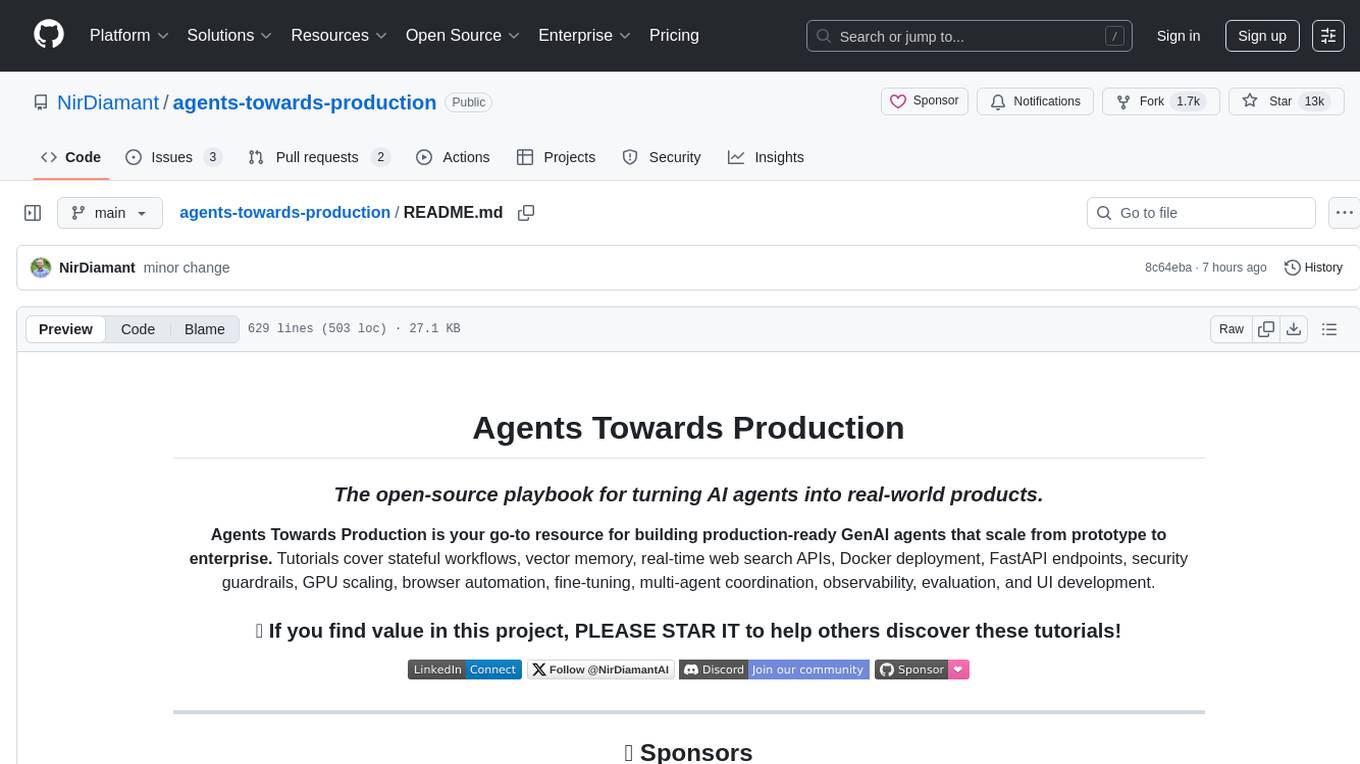
agents-towards-production
Agents Towards Production is an open-source playbook for building production-ready GenAI agents that scale from prototype to enterprise. Tutorials cover stateful workflows, vector memory, real-time web search APIs, Docker deployment, FastAPI endpoints, security guardrails, GPU scaling, browser automation, fine-tuning, multi-agent coordination, observability, evaluation, and UI development.
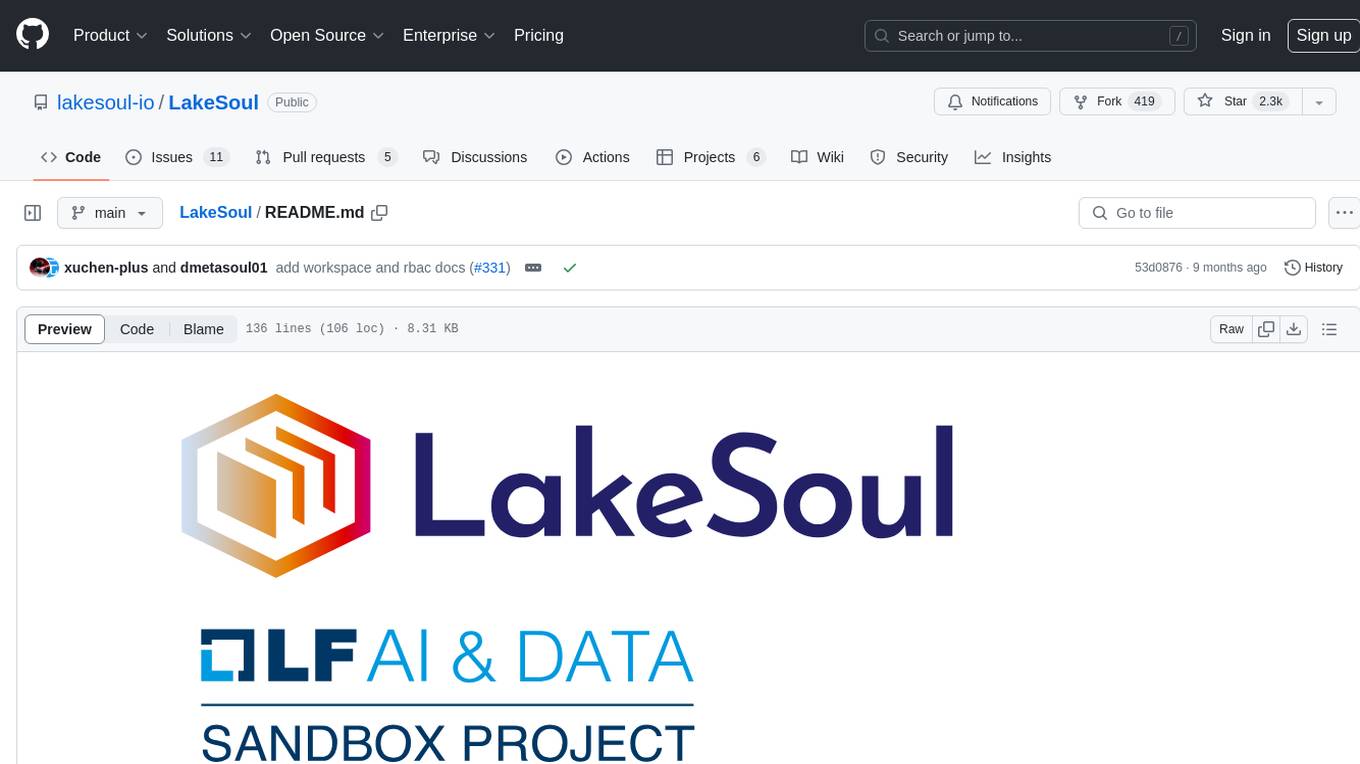
LakeSoul
LakeSoul is a cloud-native Lakehouse framework that supports scalable metadata management, ACID transactions, efficient and flexible upsert operation, schema evolution, and unified streaming & batch processing. It supports multiple computing engines like Spark, Flink, Presto, and PyTorch, and computing modes such as batch, stream, MPP, and AI. LakeSoul scales metadata management and achieves ACID control by using PostgreSQL. It provides features like automatic compaction, table lifecycle maintenance, redundant data cleaning, and permission isolation for metadata.
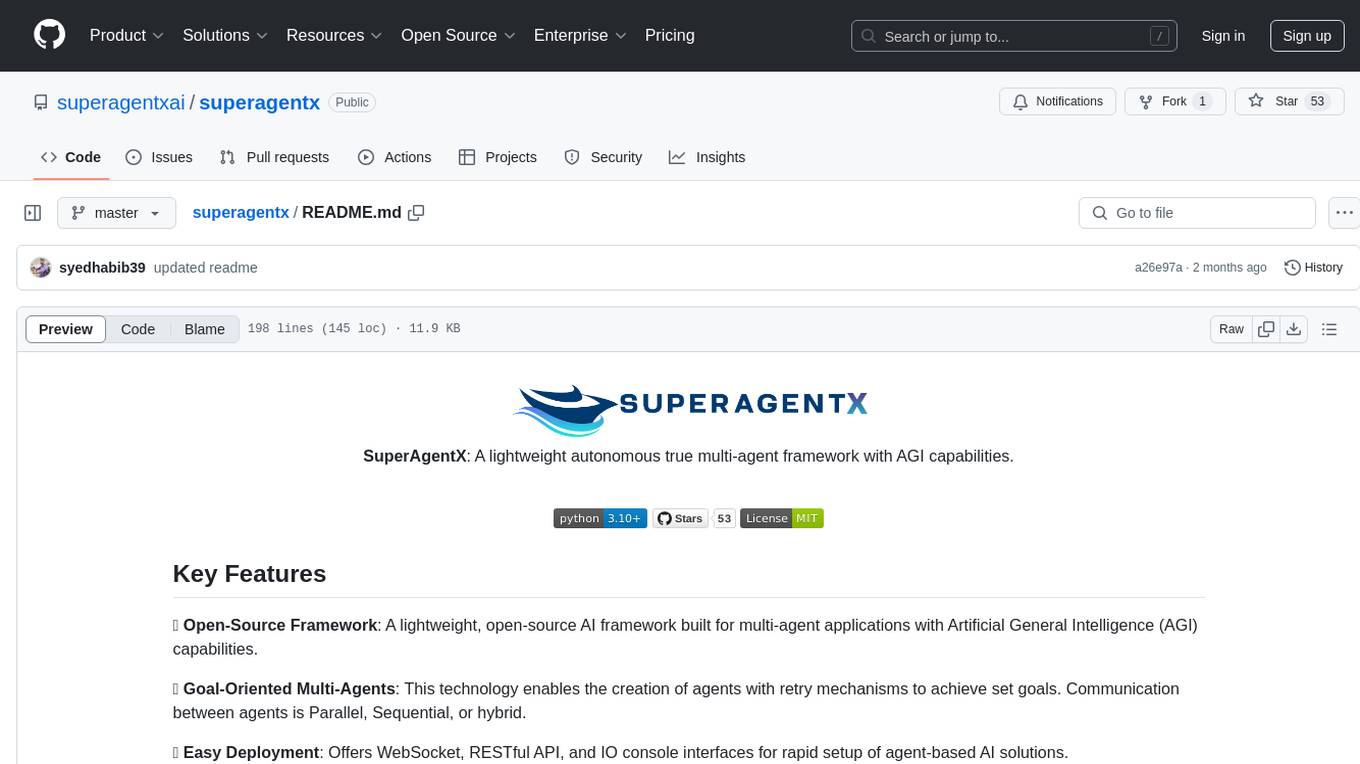
superagentx
SuperAgentX is a lightweight open-source AI framework designed for multi-agent applications with Artificial General Intelligence (AGI) capabilities. It offers goal-oriented multi-agents with retry mechanisms, easy deployment through WebSocket, RESTful API, and IO console interfaces, streamlined architecture with no major dependencies, contextual memory using SQL + Vector databases, flexible LLM configuration supporting various Gen AI models, and extendable handlers for integration with diverse APIs and data sources. It aims to accelerate the development of AGI by providing a powerful platform for building autonomous AI agents capable of executing complex tasks with minimal human intervention.
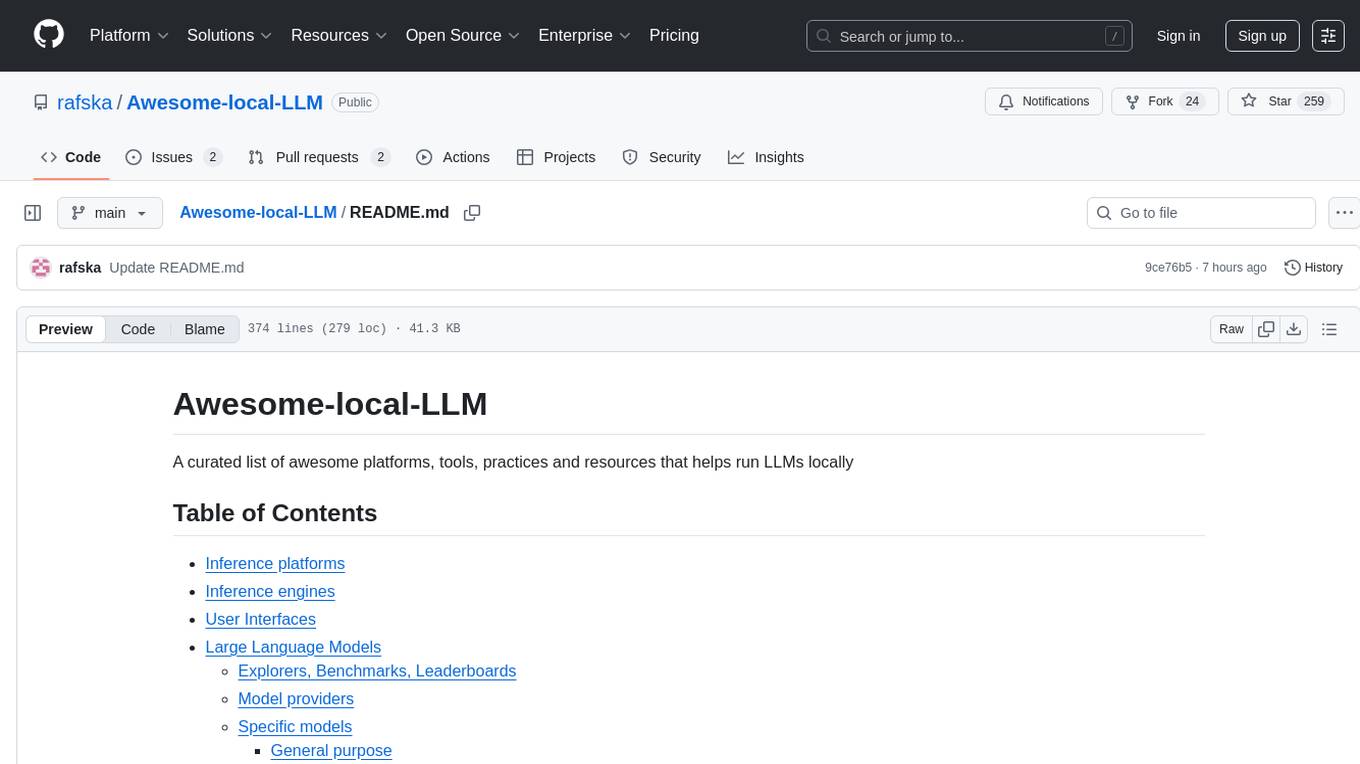
Awesome-local-LLM
Awesome-local-LLM is a curated list of platforms, tools, practices, and resources that help run Large Language Models (LLMs) locally. It includes sections on inference platforms, engines, user interfaces, specific models for general purpose, coding, vision, audio, and miscellaneous tasks. The repository also covers tools for coding agents, agent frameworks, retrieval-augmented generation, computer use, browser automation, memory management, testing, evaluation, research, training, and fine-tuning. Additionally, there are tutorials on models, prompt engineering, context engineering, inference, agents, retrieval-augmented generation, and miscellaneous topics, along with a section on communities for LLM enthusiasts.
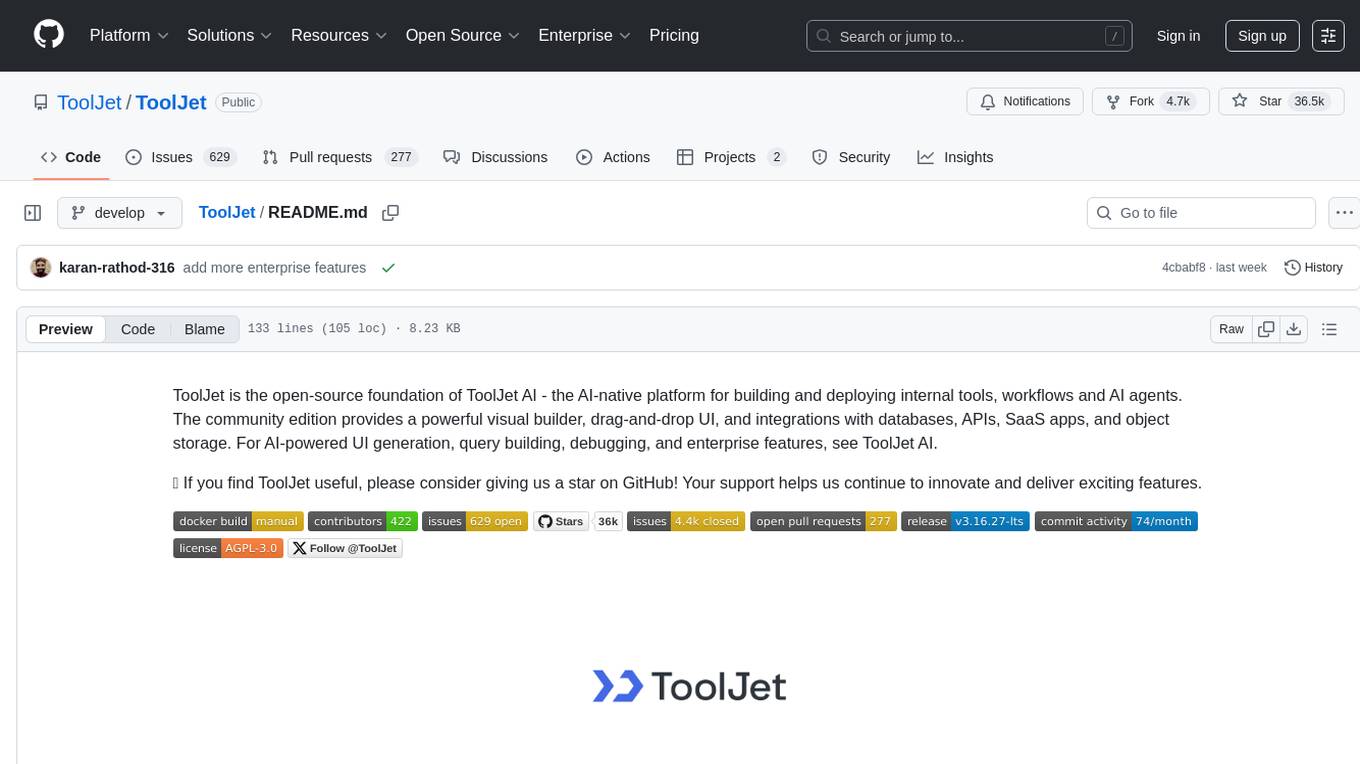
ToolJet
ToolJet is an open-source platform for building and deploying internal tools, workflows, and AI agents. It offers a visual builder with drag-and-drop UI, integrations with databases, APIs, SaaS apps, and object storage. The community edition includes features like a visual app builder, ToolJet database, multi-page apps, collaboration tools, extensibility with plugins, code execution, and security measures. ToolJet AI, the enterprise version, adds AI capabilities for app generation, query building, debugging, agent creation, security compliance, user management, environment management, GitSync, branding, access control, embedded apps, and enterprise support.
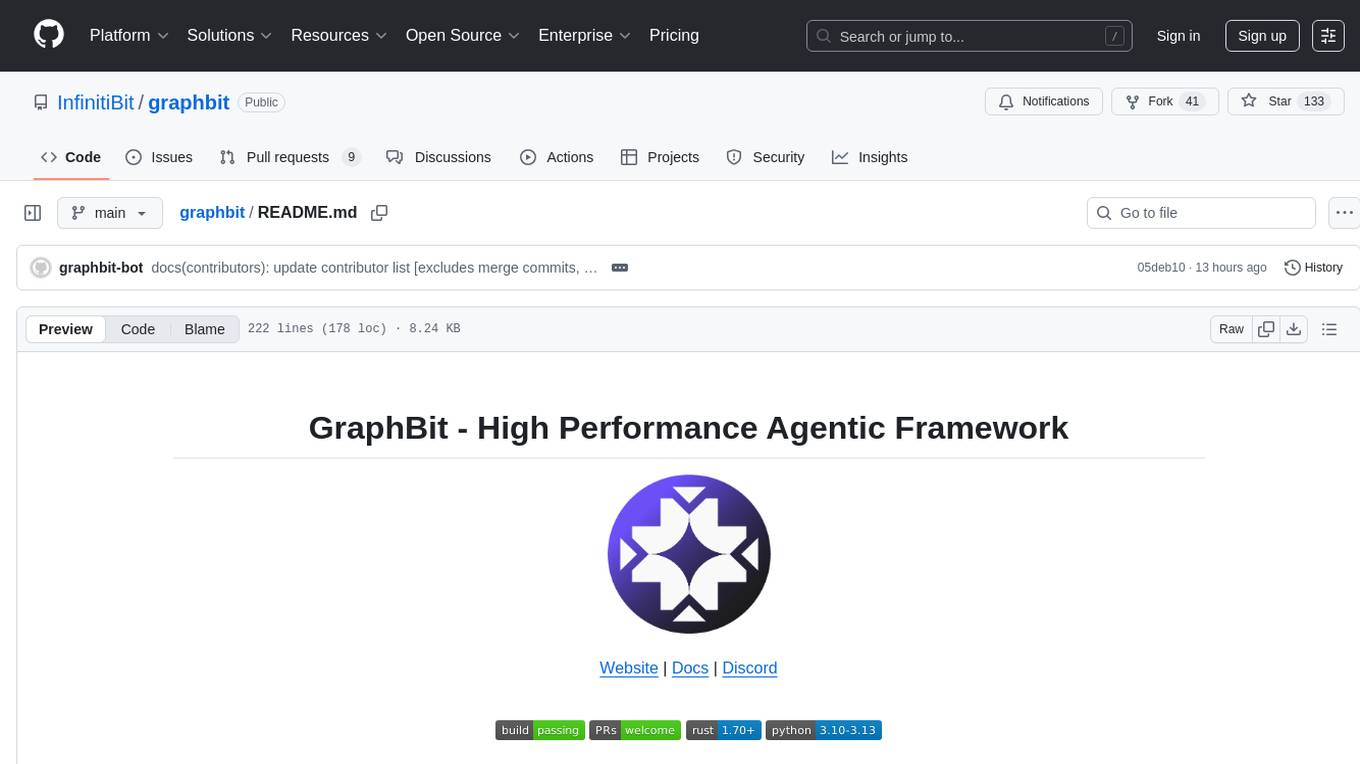
graphbit
GraphBit is an industry-grade agentic AI framework built for developers and AI teams that demand stability, scalability, and low resource usage. It is written in Rust for maximum performance and safety, delivering significantly lower CPU usage and memory footprint compared to leading alternatives. The framework is designed to run multi-agent workflows in parallel, persist memory across steps, recover from failures, and ensure 100% task success under load. With lightweight architecture, observability, and concurrency support, GraphBit is suitable for deployment in high-scale enterprise environments and low-resource edge scenarios.
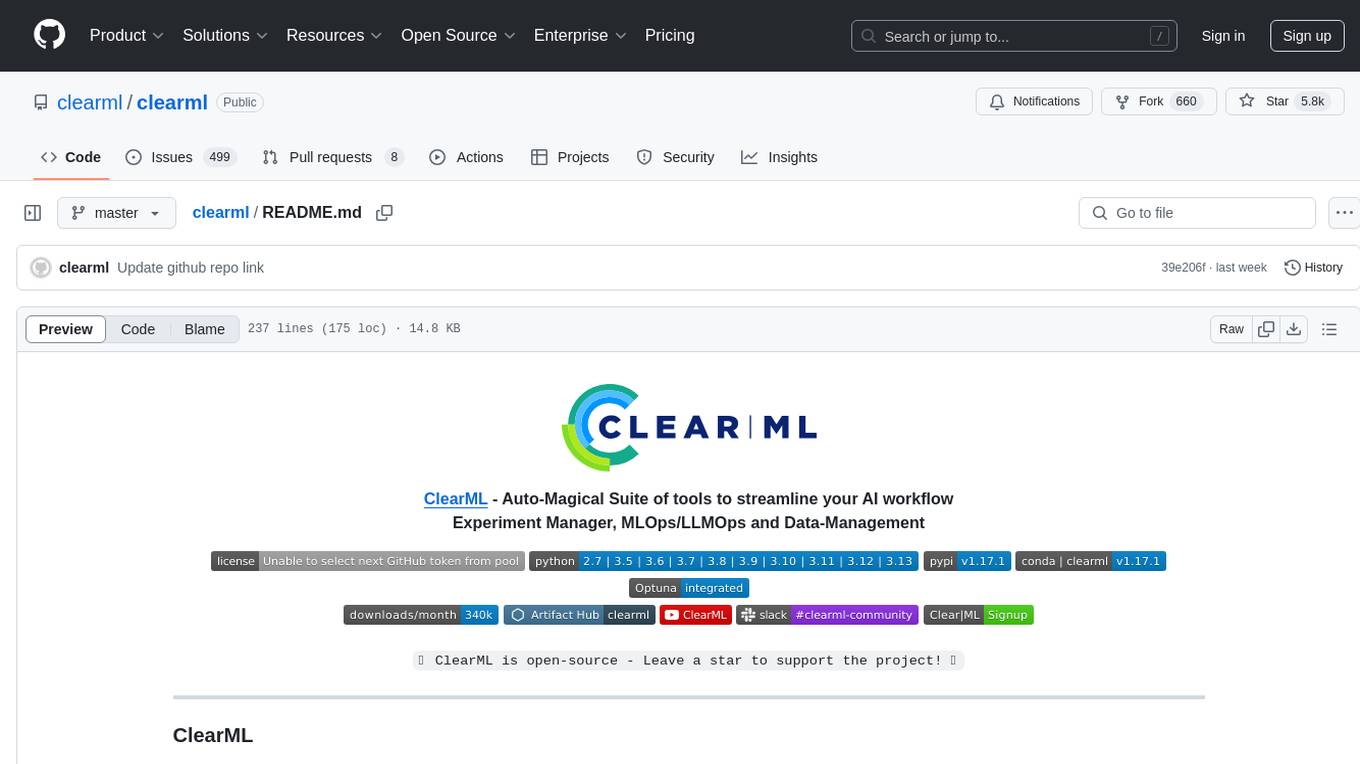
clearml
ClearML is an auto-magical suite of tools designed to streamline AI workflows. It includes modules for experiment management, MLOps/LLMOps, data management, model serving, and more. ClearML offers features like experiment tracking, model serving, orchestration, and automation. It supports various ML/DL frameworks and integrates with Jupyter Notebook and PyCharm for remote debugging. ClearML aims to simplify collaboration, automate processes, and enhance visibility in AI projects.
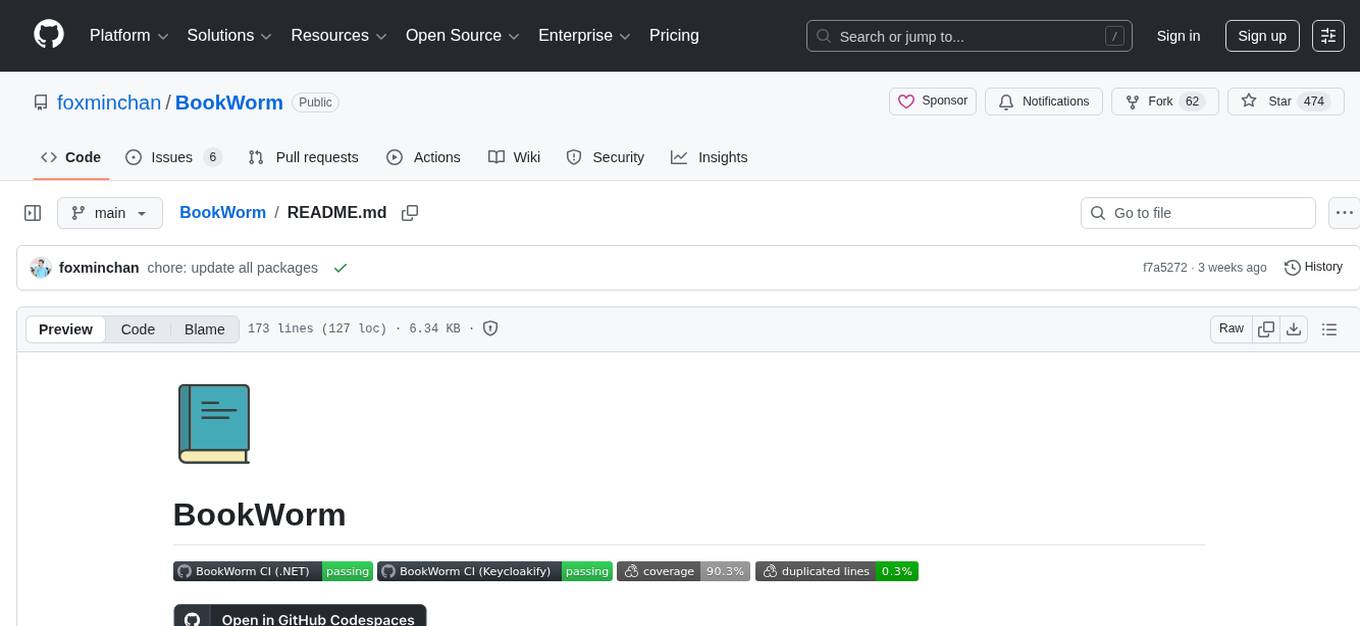
BookWorm
BookWorm is a cloud-native application showcasing Aspire with AI integration. It features DDD and VSA, multi-agent orchestration, standardized AI tooling through MCP, A2A & AG-UI Protocol support, and various microservices patterns. The project includes API versioning, feature flags, AuthN/AuthZ with Keycloak, caching with HybridCache, CI/CD with GitHub Actions, comprehensive documentation, modern client applications with Next.js, testing strategies, and more.

clearml
ClearML is a suite of tools designed to streamline the machine learning workflow. It includes an experiment manager, MLOps/LLMOps, data management, and model serving capabilities. ClearML is open-source and offers a free tier hosting option. It supports various ML/DL frameworks and integrates with Jupyter Notebook and PyCharm. ClearML provides extensive logging capabilities, including source control info, execution environment, hyper-parameters, and experiment outputs. It also offers automation features, such as remote job execution and pipeline creation. ClearML is designed to be easy to integrate, requiring only two lines of code to add to existing scripts. It aims to improve collaboration, visibility, and data transparency within ML teams.

agentic-radar
The Agentic Radar is a security scanner designed to analyze and assess agentic systems for security and operational insights. It helps users understand how agentic systems function, identify potential vulnerabilities, and create security reports. The tool includes workflow visualization, tool identification, and vulnerability mapping, providing a comprehensive HTML report for easy reviewing and sharing. It simplifies the process of assessing complex workflows and multiple tools used in agentic systems, offering a structured view of potential risks and security frameworks.
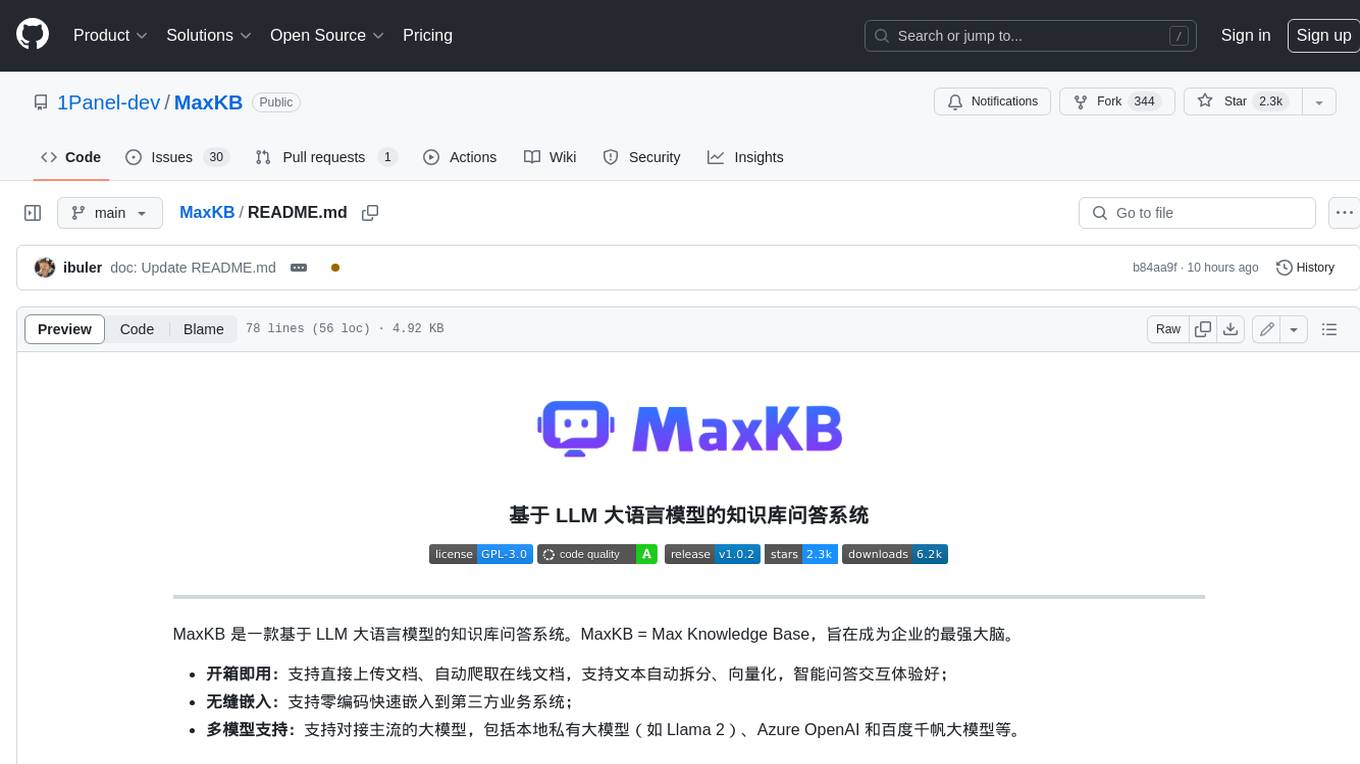
MaxKB
MaxKB is a knowledge base Q&A system based on the LLM large language model. MaxKB = Max Knowledge Base, which aims to become the most powerful brain of the enterprise.
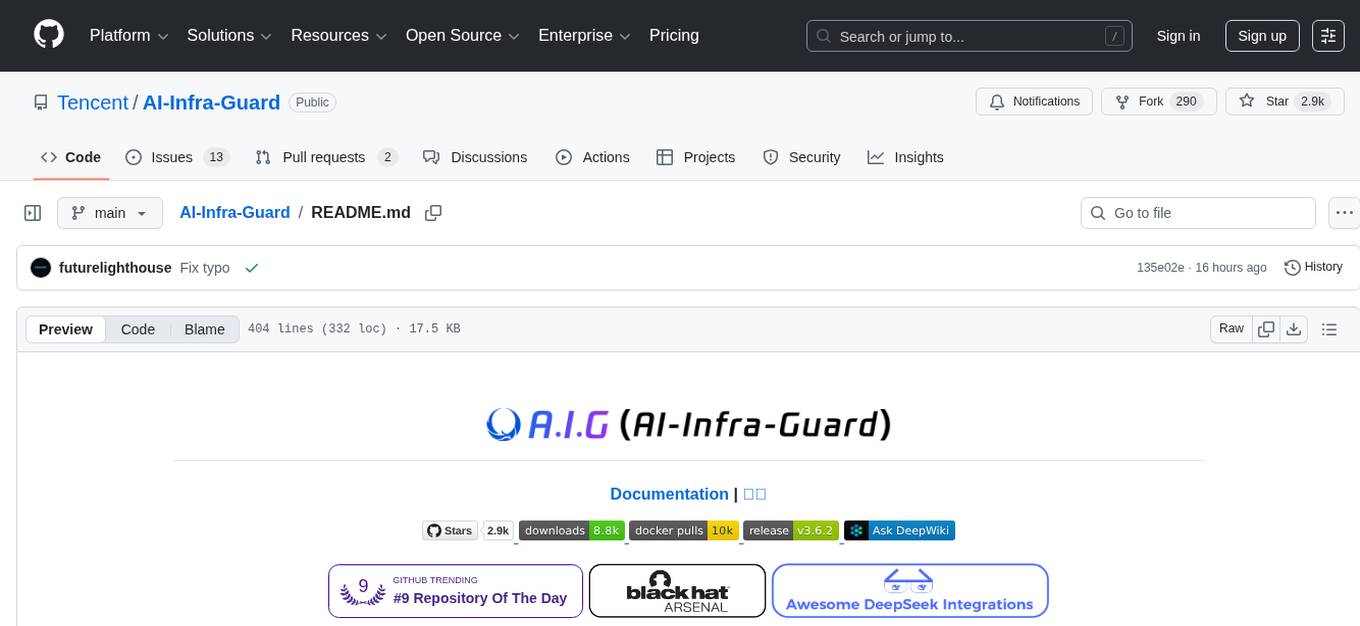
AI-Infra-Guard
A.I.G (AI-Infra-Guard) is an AI red teaming platform by Tencent Zhuque Lab that integrates capabilities such as AI infra vulnerability scan, MCP Server risk scan, and Jailbreak Evaluation. It aims to provide users with a comprehensive, intelligent, and user-friendly solution for AI security risk self-examination. The platform offers features like AI Infra Scan, AI Tool Protocol Scan, and Jailbreak Evaluation, along with a modern web interface, complete API, multi-language support, cross-platform deployment, and being free and open-source under the MIT license.
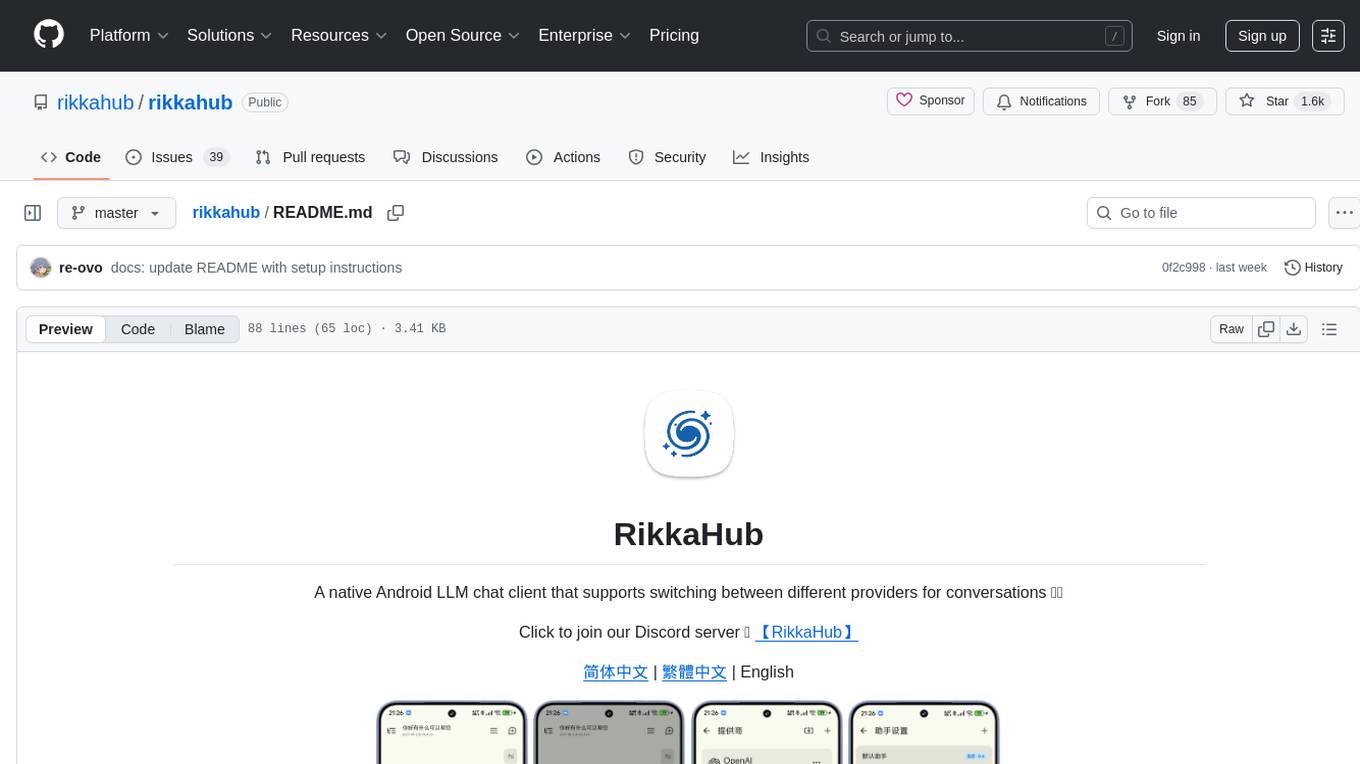
rikkahub
RikkaHub is a native Android LLM chat client that supports switching between different providers for conversations. It features a modern Android app design with dark mode, support for multiple provider types, multimodal input support, Markdown rendering, search capabilities, prompt variables, QR code export/import, agent customization, ChatGPT-like memory feature, AI translation, and custom HTTP request headers and bodies. The project is developed using Kotlin, Koin, Jetpack Compose, DataStore, Room, Coil, Material You, Navigation Compose, Okhttp, kotlinx.serialization, and compose-icons/lucide.
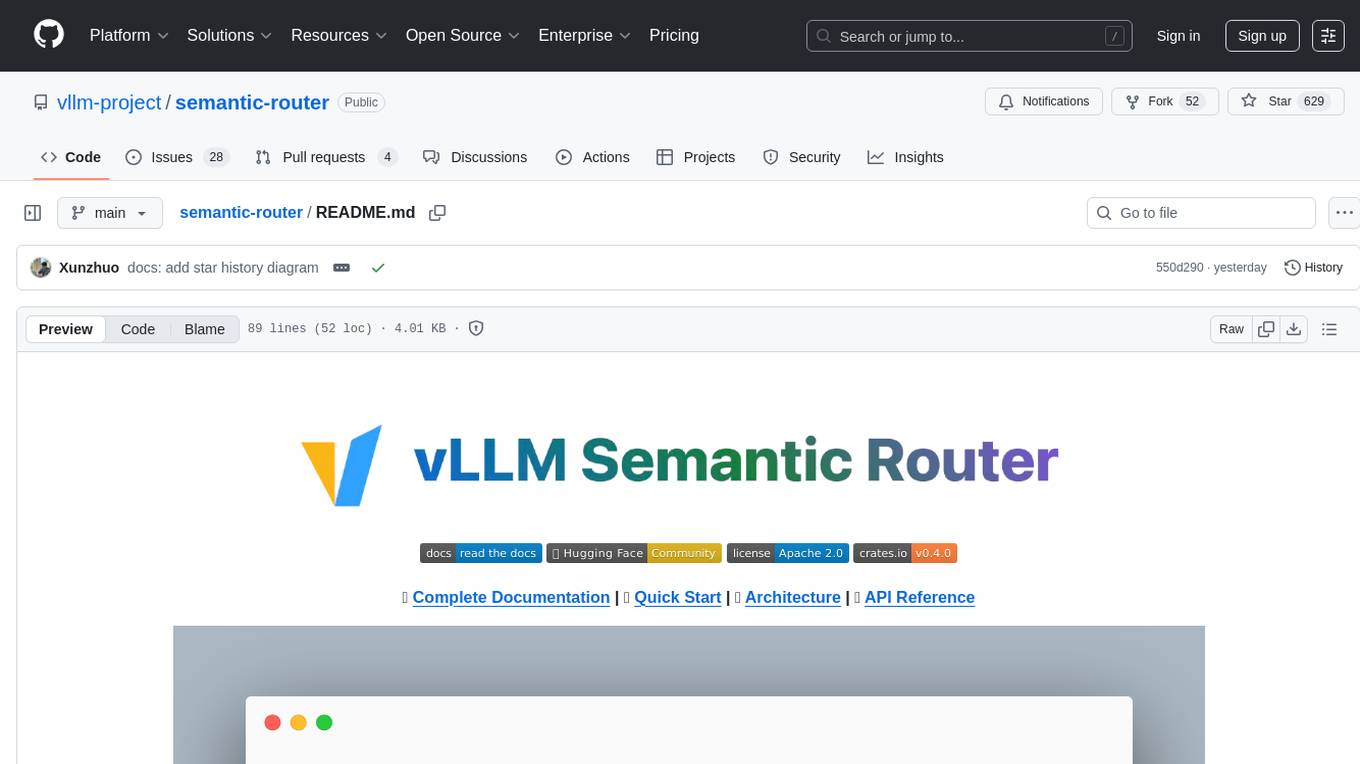
semantic-router
The Semantic Router is an intelligent routing tool that utilizes a Mixture-of-Models (MoM) approach to direct OpenAI API requests to the most suitable models based on semantic understanding. It enhances inference accuracy by selecting models tailored to different types of tasks. The tool also automatically selects relevant tools based on the prompt to improve tool selection accuracy. Additionally, it includes features for enterprise security such as PII detection and prompt guard to protect user privacy and prevent misbehavior. The tool implements similarity caching to reduce latency. The comprehensive documentation covers setup instructions, architecture guides, and API references.
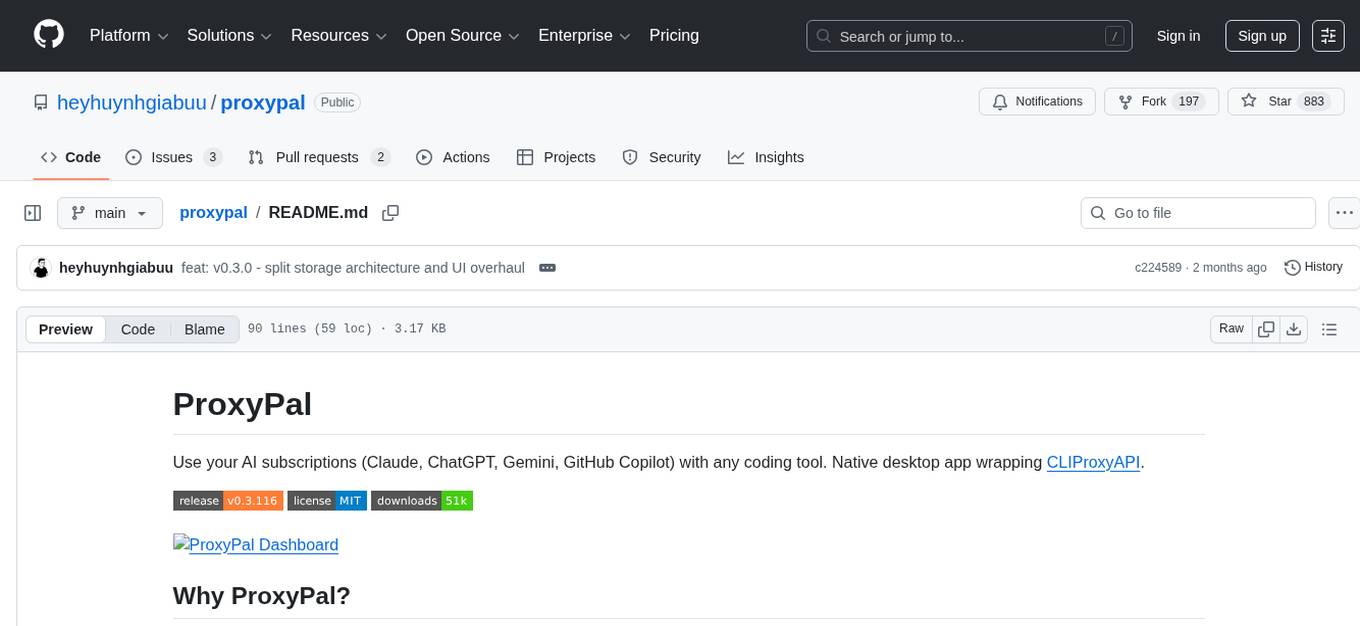
proxypal
ProxyPal is a desktop app that allows users to utilize multiple AI subscriptions (such as Claude, ChatGPT, Gemini, GitHub Copilot) with any coding tool. It acts as a bridge between various AI providers and coding tools, offering features like connecting to different AI services, GitHub Copilot integration, Antigravity support, usage analytics, request monitoring, and auto-configuration. The app supports multiple platforms and clients, providing a seamless experience for developers to leverage AI capabilities in their coding workflow. ProxyPal simplifies the process of using AI models in coding environments, enhancing productivity and efficiency.
For similar tasks

awesome-mcp-servers
A curated list of awesome Model Context Protocol (MCP) servers that enable AI models to securely interact with local and remote resources through standardized server implementations. The list focuses on production-ready and experimental servers extending AI capabilities through file access, database connections, API integrations, and other contextual services.

Azure-Analytics-and-AI-Engagement
The Azure-Analytics-and-AI-Engagement repository provides packaged Industry Scenario DREAM Demos with ARM templates (Containing a demo web application, Power BI reports, Synapse resources, AML Notebooks etc.) that can be deployed in a customer’s subscription using the CAPE tool within a matter of few hours. Partners can also deploy DREAM Demos in their own subscriptions using DPoC.

sorrentum
Sorrentum is an open-source project that aims to combine open-source development, startups, and brilliant students to build machine learning, AI, and Web3 / DeFi protocols geared towards finance and economics. The project provides opportunities for internships, research assistantships, and development grants, as well as the chance to work on cutting-edge problems, learn about startups, write academic papers, and get internships and full-time positions at companies working on Sorrentum applications.

tidb
TiDB is an open-source distributed SQL database that supports Hybrid Transactional and Analytical Processing (HTAP) workloads. It is MySQL compatible and features horizontal scalability, strong consistency, and high availability.

zep-python
Zep is an open-source platform for building and deploying large language model (LLM) applications. It provides a suite of tools and services that make it easy to integrate LLMs into your applications, including chat history memory, embedding, vector search, and data enrichment. Zep is designed to be scalable, reliable, and easy to use, making it a great choice for developers who want to build LLM-powered applications quickly and easily.

telemetry-airflow
This repository codifies the Airflow cluster that is deployed at workflow.telemetry.mozilla.org (behind SSO) and commonly referred to as "WTMO" or simply "Airflow". Some links relevant to users and developers of WTMO: * The `dags` directory in this repository contains some custom DAG definitions * Many of the DAGs registered with WTMO don't live in this repository, but are instead generated from ETL task definitions in bigquery-etl * The Data SRE team maintains a WTMO Developer Guide (behind SSO)

mojo
Mojo is a new programming language that bridges the gap between research and production by combining Python syntax and ecosystem with systems programming and metaprogramming features. Mojo is still young, but it is designed to become a superset of Python over time.

pandas-ai
PandasAI is a Python library that makes it easy to ask questions to your data in natural language. It helps you to explore, clean, and analyze your data using generative AI.
For similar jobs

sweep
Sweep is an AI junior developer that turns bugs and feature requests into code changes. It automatically handles developer experience improvements like adding type hints and improving test coverage.

teams-ai
The Teams AI Library is a software development kit (SDK) that helps developers create bots that can interact with Teams and Microsoft 365 applications. It is built on top of the Bot Framework SDK and simplifies the process of developing bots that interact with Teams' artificial intelligence capabilities. The SDK is available for JavaScript/TypeScript, .NET, and Python.

ai-guide
This guide is dedicated to Large Language Models (LLMs) that you can run on your home computer. It assumes your PC is a lower-end, non-gaming setup.

classifai
Supercharge WordPress Content Workflows and Engagement with Artificial Intelligence. Tap into leading cloud-based services like OpenAI, Microsoft Azure AI, Google Gemini and IBM Watson to augment your WordPress-powered websites. Publish content faster while improving SEO performance and increasing audience engagement. ClassifAI integrates Artificial Intelligence and Machine Learning technologies to lighten your workload and eliminate tedious tasks, giving you more time to create original content that matters.

chatbot-ui
Chatbot UI is an open-source AI chat app that allows users to create and deploy their own AI chatbots. It is easy to use and can be customized to fit any need. Chatbot UI is perfect for businesses, developers, and anyone who wants to create a chatbot.

BricksLLM
BricksLLM is a cloud native AI gateway written in Go. Currently, it provides native support for OpenAI, Anthropic, Azure OpenAI and vLLM. BricksLLM aims to provide enterprise level infrastructure that can power any LLM production use cases. Here are some use cases for BricksLLM: * Set LLM usage limits for users on different pricing tiers * Track LLM usage on a per user and per organization basis * Block or redact requests containing PIIs * Improve LLM reliability with failovers, retries and caching * Distribute API keys with rate limits and cost limits for internal development/production use cases * Distribute API keys with rate limits and cost limits for students

uAgents
uAgents is a Python library developed by Fetch.ai that allows for the creation of autonomous AI agents. These agents can perform various tasks on a schedule or take action on various events. uAgents are easy to create and manage, and they are connected to a fast-growing network of other uAgents. They are also secure, with cryptographically secured messages and wallets.

griptape
Griptape is a modular Python framework for building AI-powered applications that securely connect to your enterprise data and APIs. It offers developers the ability to maintain control and flexibility at every step. Griptape's core components include Structures (Agents, Pipelines, and Workflows), Tasks, Tools, Memory (Conversation Memory, Task Memory, and Meta Memory), Drivers (Prompt and Embedding Drivers, Vector Store Drivers, Image Generation Drivers, Image Query Drivers, SQL Drivers, Web Scraper Drivers, and Conversation Memory Drivers), Engines (Query Engines, Extraction Engines, Summary Engines, Image Generation Engines, and Image Query Engines), and additional components (Rulesets, Loaders, Artifacts, Chunkers, and Tokenizers). Griptape enables developers to create AI-powered applications with ease and efficiency.
